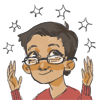Serendip is an independent site partnering with faculty at multiple colleges and universities around the world. Happy exploring!
You are here
Home » Web Paper or Special Event
By aquato
September 26, 2014 - 17:12
How can someone so small stand in the face of a mountain of slurs, taunts, and hostility? In Eli Claire’s memoir Exile and Pride, his answer is reclamation. Whenever I’ve heard the term thrown around, it was always used as reclaiming slurs—victims turning hurtful, oppressive language into symbols of pride. Clare sticks to this concept steadfastly, saying that “words of violence and hatred can be neutralized or even turned into words of pride” (Clare 109). Based on this, it can be garnered that reclamation is used to uphold pride in an individual and in a community. Just as nature can reclaim lands believe to be uninhabitable, so can people reclaim an ugly word and turn it into something beautiful.
September 26, 2014 - 16:57
Handicapped or handicap stemmed from the mid-17th century phrase hand in cap. It was a lottery game in which “one person claimed an article belonging to another and offered something in exchange, any difference in value being showed decided by the umpire. All three deposited forfeit money in a cap; the two opponents showed there agreement or disagreement with the valuation by bringing out their hands either full or empty.
September 26, 2014 - 16:45
Grace Chung
September 26, 2014
ESEM Paper 4
Crippling the Norms
When my friend broke her left leg in ninth grade, she was temporary nicknamed The Ninth Grade Cripple or NGC for short. Boys would run up to her in the halls or when she hobbled up the stairs and taunt her—as if being called a cripple was a bad thing. What my friend learned from her experience as the NGC was that calling a person a cripple was an insult; the word should only reference people who negatively stood out due to their physical disabilities or deformities.
September 26, 2014 - 16:32
What do you think of when you hear the word “Queer?” To some this word is bitter. It carries hate and pain and hurt. To some it is foreign. I grew up never hearing the word used in a negative way or a positive way. To some, like Eli Clare, it carries a sense of pride. It feels like home. Queer means resistance, love, and freedom. According to the OED, the colloquial definition of queer is “Of a person: homosexual. Hence: of or relating to homosexuals or homosexuality.” ("Queer," def. adj.1). In Exile and Pride, as well as in the world today, queer has a much larger range than this definition.
September 26, 2014 - 16:12
By using something to its full, we engage in the exploitation of that particular object (Oxford Dictionaries). In this context, the word “exploit” sounds harmless. However, when used to describe actions done to a person, the word takes on a harsher meaning. Eli Clare makes his understanding of the word clear in his text: to exploit someone is to act selfishly. For Clare, when done with self-serving desires, exploitation is essentially “pure thievery (Clare 91).”
September 26, 2014 - 14:53
In Exile and Pride, Eli Clare discusses multiple topics that range from freedom and sexuality to disability. Each topic is usually kept confidential from other beings, unless they are close relations. But, Eli provides personal insights and teachings since he has lived with the struggles that each topic adds. Many of his short stories, that are packs into the book, concludes with writing personal reflections in which he tries to end his material oppression. He uses the reflections to reflect on times where he felt shame, without actually using the exact term.
September 26, 2014 - 14:41
By ally
September 26, 2014 - 11:22
Place
As the results of the online Merriam-Webster dictionary shows, the word ‘place’ has 12 different interpretations, and I believe there could be more than 120 kinds of meaning of the word depending on different people’s own perception. ‘Place’ is also a word mentioned many times by the writer and it’s even the title of part I of the book. So, what is the connotation of ‘place’ in this book, exile and pride?
September 26, 2014 - 09:51
It is arguable that the journey of life is one enriched with self-discovery. Being such a cognitive species, humans have always sought reason in the world and purpose in life. I find this to be proven that much more through Eli Clare’s Exile and Pride. In this work, Clare takes the reader on a journey through time. He opens up about his insecurities, doubts, and clarity in his being. The only word that comes to mind, in the case of what Clare was telling the reader and looking for in his life, is identity.The word “identity” came about in the English language in the late 1600’s, around the time of the Scientific Revolution and Enlightenment.
September 26, 2014 - 02:32
Eli Clare, in his novel, Exile and Pride, disputes the societal “norms” which he feels unjustly lead people to perceive themselves as abnormal or lesser than those around them. These social constructs, Clare believes, create a falsified perception of not only what is normal, but unjustly align “normal” with “good” and “abnormal” with the word “freak.” Clare, in asserting that “freak” is a word that tears a rift between sects of society, and casts the differences in people in a negative light, challenges our preconceptions of what we deem “normal” and the consequences such word choice can have on those around us.










